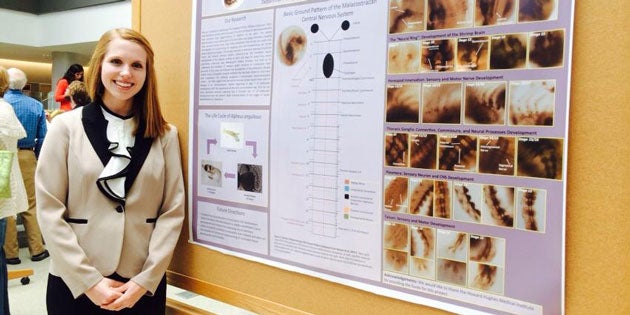
Patricia Cooney displays her research involving why the snapping shrimp regenerates its large claw on the opposite side from which it was lost.
Patricia Cooney ’16 is an inquisitive student who isn’t afraid to ask questions or try something new. She’s fascinated by how things work and the biological factors that drive organisms to function the way they do.
The biology major has spent the bulk of her time at the College researching neural plasticity in snapping shrimp – specifically the unique ambidextrous regeneration of the shrimp’s large snapping claw. But amid all that technical scientific research, the Honors College student has also found time to embrace her musical side as a vocal minor. She’s performed children’s opera for local schools and selections from such works as Puccini’s “Suor Angelica” with the College’s Opera Program.
For those who have witnessed Cooney’s impressive academic journey, it came as no surprise that she was selected last month as the 2016 recipient of the College of Charleston’s Bishop Robert Smith Award, which recognizes students who demonstrate exceptional leadership and academic excellence.
But Cooney, who graduated in May 2016, was taken aback by the honor.

As a vocal minor, Patricia Cooney has performed operatic adaptations of fairy tales for local schools.
“There were some other really, really awesome people that were nominated for the award,” she says. “I was a little shocked honestly, but really excited.”
Biology professors Chris Korey and Melissa Hughes recommended Cooney for the award after seeing her passion and leadership firsthand in the lab.
“She is a quick, curious and engaged scholar, highly self-motivated and independent,” Hughes wrote in her letter of recommendation to the committee. “In her work in our lab, she has become a full scientific collaborator, influencing the direction of our research. She has also emerged as a natural leader in the lab, someone to whom the other students look to for guidance.”
Cooney’s work with the two professors led her to delve into her own experiment examining why snapping shrimp drop their large claw in the first place. For Korey, who met the biology student prior to her freshman year, seeing Cooney’s growth has been rewarding.
“It’s nice to watch a student develop from a high school student to an independent researcher and someone who’s involved in the community,” he says.

Cooney has participated in several study abroad courses, including a neuroscience seminar in Germany.
Her fascination with neuroscience began during childhood after a few of her family members were diagnosed with a psychiatric illness. Since then, her interest in neuorscience has never flagged, and in April she earned a Fulbright Scholarship to conduct research at the Max Planck Institute of Neurobiology in Martinsried, Germany, where she’ll spend a year investigating the behavior of Zebrafish larvae through live imaging of their brains. She previously completed a summer seminar in neuroscience in Germany, studying at the Ludwig Maximilians Universitat in Munich and the Charite Medical University in Berlin.
Cooney, who is a rare combination of science nerd with a twist of a musician’s passion and outgoing personality, is weighing what all of this scientific exploration means for her future. She’s thinking of pursuing a Ph.D. in neuroscience and teaching at an undergraduate institution. But then sometimes her mind goes back to the impact mental illness has had on her family, and she wonders whether a career in public policy or advocacy is the way to go.
No matter what the future holds, Cooney is proud of her time at the College.
“I really put a lot of myself into the College of Charleston,” she says. “It’s a rewarding thing to be able to walk away and say, ‘Yes, I was fully here and I did everything that I would have wanted to do at the College.’”





